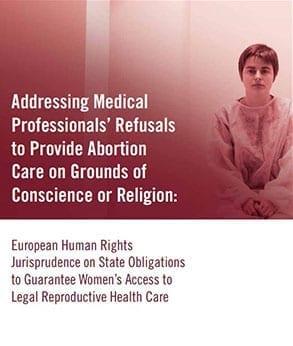Spain Taking Cue from Poland With Restrictive Abortion Law
By Johanna Westeson, Regional Director for Europe at the Center for Reproductive Rights
Spanish Prime Minister Mariano Rajoy wants to make most abortions in his country illegal. If he succeeds, Spain will become only the second country in Europe to move from a liberal to a restrictive abortion regime, stripping Spanish women of a fundamental right granted women in most other European countries.
Abortion was first decriminalized in Spain in 1985, but even then the procedure was legal only for rape victims and when a woman’s pregnancy had severe fetal impairments or posed a serious risk to her life or health. And in 2010, the Spanish government took an historic step and amended the law to allow abortion through 14 weeks of pregnancy for all women, without restriction as to reason.
Now, just a few years later, Prime Minister Rajoy is attempting to turn back the clock on women’s reproductive autonomy, publicly committing to work with Justice Minister Alberto Ruiz-Gallardón to introduce new legislation before the summer recess that would once again criminalize abortion with only two narrow exceptions: rape and when a woman’s health or life is at risk.
We don’t have to imagine what will happen to women in Spain if politicians are successful in restricting access to safe and legal abortion so severely. We need only look eastward, to Poland.
Poland is the only country in Europe to dramatically reverse its abortion laws, which has made legal and safe abortion almost nonexistent for all Polish women—including rape victims and women whose pregnancies are afflicted with fetal anomalies. According to the Polish law women should have a right to abortion under those circumstances. But the reality is very different.
In November 2012, the European Court of Human Rights condemned Poland’s government for blocking access to a legal abortion for a teenage rape victim known as P. She followed the letter of the law in an effort to obtain a safe, legal abortion—her fundamental right. But P faced one obstacle after another, without any help from the state authorities who should have protected her.
Obstruction came from every direction. A Catholic priest and anti-abortion groups pressured her to carry her pregnancy to term. The hospital deliberately disclosed her personal information to the media. Doctors harassed and vilified not only P, but also her mother simply for supporting her daughter. Even the police failed to protect this 14-year-old girl—interrogating P and later removing her from her mother’s custody, whom they painted as coercing P to end the pregnancy.
P was only finally able to get an abortion in secret, in a hospital far from her home. She was not registered as a patient and never received post-abortion care. After a legal case was filed on P’s behalf, the European Court of Human Rights finally affirmed—more than four years later—that P’s rights were violated. Importantly, the court acknowledged that young people have a right to sexual and reproductive self-determination and that this right had been grossly violated in P’s case.
Poland should serve as a stark example to Prime Minister Rajoy and Justice Minister Gallardón of what the true and devastating consequences of restrictive abortion laws are for women. While fewer than 200 legal abortions are performed in Poland each year, there are an estimated 80,000 to 200,000 unsafe abortions happening annually. These include abortions that are legal but inaccessible in practice due to the stigma attached to abortion and health providers’ widespread refusal to perform abortions on so-called conscience grounds. Poland’s restrictive law is to blame and Spain will meet this same fate if it doesn’t call off plans to reverse its current abortion law.
Women have a basic human right to control their fertility, to determine when and whether they want to start a family. If Spanish officials are successful in denying the women of their country this fundamental right, it will lead to all women being shamed and stigmatized for seeking essential medical care—even those whose right to abortion will still be legally recognized. But it will not stop women from terminating their pregnancies.
Some Spanish women may be able to afford the trip to Portugal or another European country where abortion is legal. But many women won’t have that option and will do what thousands of Polish women are forced to do every year: seek an unsafe abortion that could cost them their lives.
There’s still time to stop this tragedy from happening. The strong progressive voices in the Spanish Parliament must continue to push back against Rajoy and Gallardón as discussions of a revised abortion bill continue behind closed doors. The only way to safeguard women’s human rights is to ensure they have access to reproductive health care, including safe and legal abortion.
Read the original OpEd in Spanish on ElDiario.es >,
Johanna Westeson is the Regional Director for Europe at the Center for Reproductive Rights.

